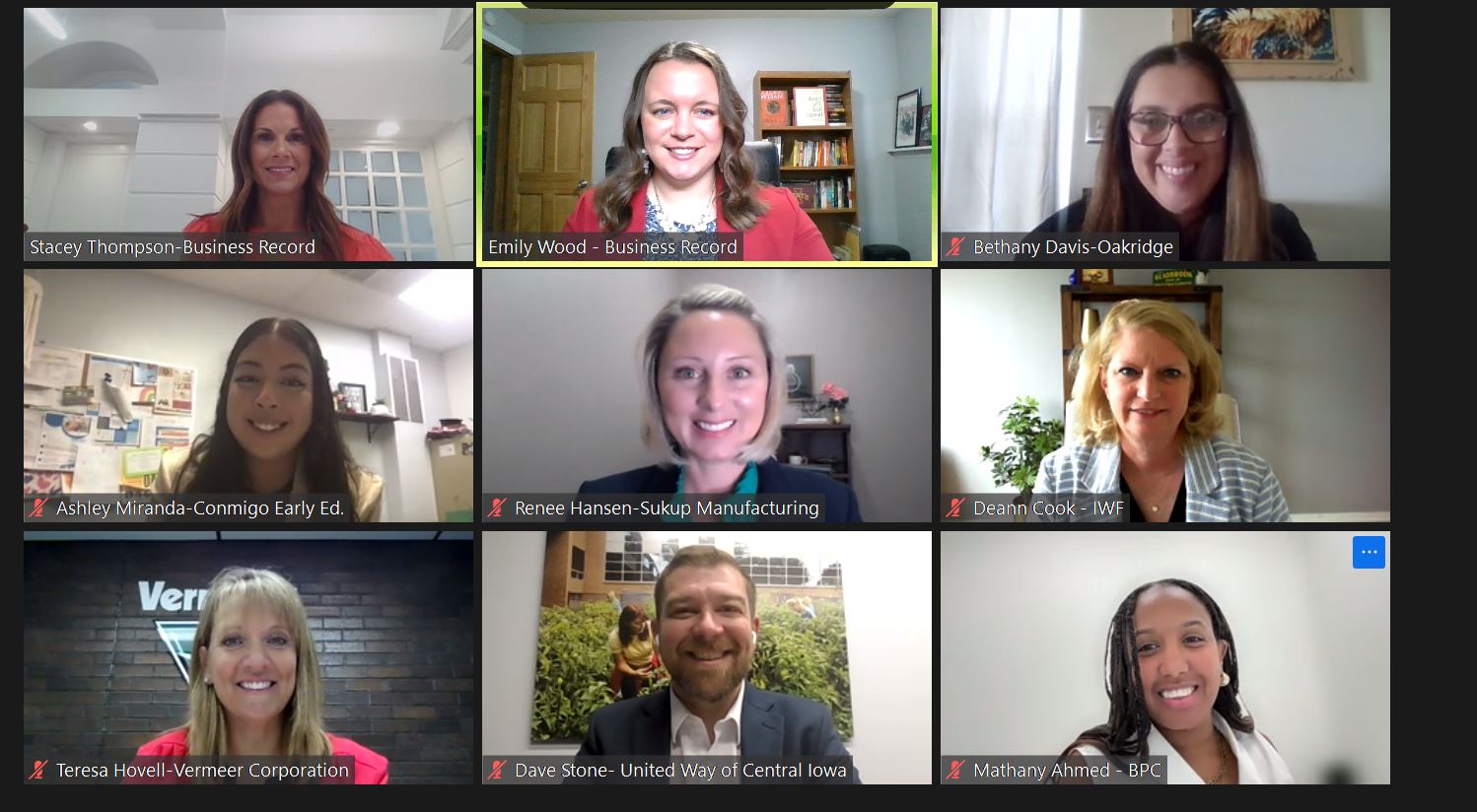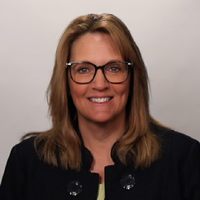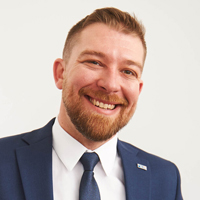Fearless Focus on child care: No solutions are simple, and persistence is necessary to continue progress

Iowa is in the midst of a marathon, providers and experts said, toward a goal of families being confident that they can sign up for high-quality child care, near where they live, without busting their budgets.
Big improvements over the course of decades mean a lot of ground has already been traveled, but huge shortcomings in availability and costs remain. No solutions are simple, and persistence is necessary to continue progress, said panelists at the Business Record’s June 20 Fearless Focus virtual event on child care.
“We have lots of issues we still need to work on,” said Bethany Davis, vice president for early childhood for Des Moines’ Oakridge Neighborhood nonprofit. “However, I am amazed in the 23 years that I’ve been in the field how far we have come, and I think we have people’s ears. I think we have legislators’ attention. I think we’re making progress. And we’re always advocating. So, keep advocating.”
The one-hour forum, moderated by Emily Wood, the Business Record’s special projects editor, brought together longtime advocates who have been in the trenches in child care facilities and in policy discussions involving businesses, local communities and state policymakers.
“Child care is the No. 1 expense for the typical Iowa family’s budget. For a family of two, with two kids in child care, we’re talking well over $1,293 a month. That far outpaces even housing costs for families,” said Dave Stone, advocacy officer at United Way of Central Iowa. “We’ve seen a movement across the country on behalf of employers … to start offering caregiving benefits or dependent care benefits to their employees. Companies can see improvements in employee satisfaction, engagement, retention and productivity. … There’s been a number of company case studies, as well, that found that for every $1 that they spend on caregiving benefits, it results in a gain of $18.93. So quite a good [return on investment].”
When Fearless surveyed its audience about gender equity in Iowa, three-quarters of respondents identified affordable child care as a major issue. Companies, in some cases with the aid of state grants, have set up innovative offerings in or near workplaces, and policy changes at the Statehouse will provide more flexibility for providers and higher reimbursements tied to a state program to assist lower-income families with child care.
But many challenges remain, and, despite advances, new pressures are emerging, too, such as school districts exploring or even implementing four-day weeks that would create new child care needs. It all adds up to urgent questions about a service that is vital for families and for the economy.
“Not only are we serving the employees, the parents, but also we are working hand in hand with the future generation,” said Ashley Miranda, assistant director and family development coordinator for Conmigo Early Education Center in central Des Moines. “We spend so much of the children’s day with them, we want to teach them, we want to make sure we can give them the best that we can.”
The panelists for the June 20 Fearless Focus virtual forum included:
- Deann Cook, president and CEO, Iowa Women’s Foundation
- Bethany Davis, vice president – early childhood, Oakridge Neighborhood
- Renee Hansen, external relations manager, Sukup Manufacturing Co.
- Teresa Hovell, benefits manager, Vermeer Corp.
- Ashley Miranda, assistant director and family development coordinator, Conmigo Early Education Center
- Dave Stone, advocacy officer, United Way of Central Iowa
Below are more highlights from the panelists’ remarks, which have been edited and condensed for clarity, about current barriers and how Iowa can continue to make progress:

Deann Cook:
Our focus at Iowa Women’s Foundation has been not so much free and low-cost care, but raising wages for the child care workforce without having to put that burden on child care centers. And the way we’ve done that is we’re supporting 13 communities throughout the state on a Wage Enhancement Program. So there was a matching grant from the state; the community or county raised funds among business partners, individuals; those were matched by the state for a Wage Enhancement Program that allows registered child care providers in those areas to tap that fund to raise wages for their child care workforce. So if the business model of the child care facility doesn’t allow them to pay more — which, for all the reasons you’ve heard, that’s usually true — the community can become part of investing in that workforce through a public-private partnership match with state dollars to raise those wages. So the small difference in pay makes a big difference in retaining folks and recruiting them.

Ashley Miranda:
We have plenty of 17-year-olds here at Conmigo [allowed to assist at child care facilities under a new state law]. And honestly, we absolutely love them, especially for center field trips, when we just need a lot of hands on deck, and especially at the swimming pool. So they are great. And it’s really nice that we’re able to hire them at such a young age, especially when we can really instill the importance of early education into them early enough to where they can dedicate themselves to this and understand just how important it is to play a role and be intentional with it. It does require lots and lots of training. And a lot of side-by-side training, leading by example. And that does take an effect on us daily when these teenagers are still in high school during the day, so they can only come to us after school, and then they only get two hours of training every day. So that training really takes a very long time; it can take months rather than two weeks.

Renee Hansen:
The Child Care Task Force with Gov. Kim Reynolds came up with a lot of creative ideas. Sukup was awarded a state grant in partnership with a consortium of our community — not just Sukup as a business, but we work together with the school district, we work together with a bank in town, in order to create and build an infrastructure, and thanks to state funding, we’re able to do that as a grant match. We are in the process of building an infrastructure right now in Sheffield, Iowa, that will house close to 110 children in a child care desert. The only other child care that is in Sheffield that I know of right now only houses 36 kids. So there is a huge need for it. This taskforce really opened the doors to other ideas and public-private partnerships.

Teresa Hovell:
You have to be very proactive, you have to find the resources in your community. Pella is a 10,000-person community, but go past that. Look at the next town, pull every resource and every business that you can, where you’re also pulling in your team members, and have open and honest conversations. Make them part of it, so it’s not just a business trying to attract talent, it’s a business trying to work with the community. I think that is the key to being able to collaborate, to find opportunities and to create that experience. … Every community is a little bit different. But Vermeer did a lot of work, working within our county and within our community, talking to different providers, whether they be in-home or an established center, on talking with the schools to understand what is necessary to do this. But I think it has to be very much that effort of saying, “We want to work with you. And we want to work with you on behalf of our community, not just behalf of us as a business.”

Dave Stone:
We’ve been working with the Polk County Board of Supervisors to study this issue, help our policymakers understand that it is a critical issue. They did award us $2.6 million in grant funding to address affordability and accessibility with our local child care coalition here in the metro region. We’ve also engaged with federal partners such as the National Fund. And one of those things that we received a grant for is to work on increasing worker satisfaction, promoting quality work environments, increasing those wages, because this is a complex problem to solve. Many of our business partners would say, when you look at the math, when you look at the business model, it doesn’t make sense, and it really doesn’t. But it is one of those critical things that are necessary for any business that wants to open a new factory or plant or manufacturing location. Nuclear families with kiddos won’t just move there. They don’t have extended family to take care of the kids. We need to really think of child care as that sort of first entrance point, the welcome mat, if you will, as you’re trying to attract and retain new talent.

Bethany Davis:
Oakridge as an organization or neighborhood is pretty diverse. Culturally, just having people understand that preschool is important, and is a pretty good indicator of how they will learn, to be successful and prepared in the future, is a little difficult to get sometimes for the families of our neighborhood. Children do often come to us with no English, or maybe an older sibling who does speak for them or their parents, so the language is a little bit of a barrier. Fortunately, we know that children that young do learn English pretty easily. Our main concern is we want them on par and ready for school just like any other student. We do have some resources that make it a little easier, but it is challenging, just having the different languages and cultural barriers.

